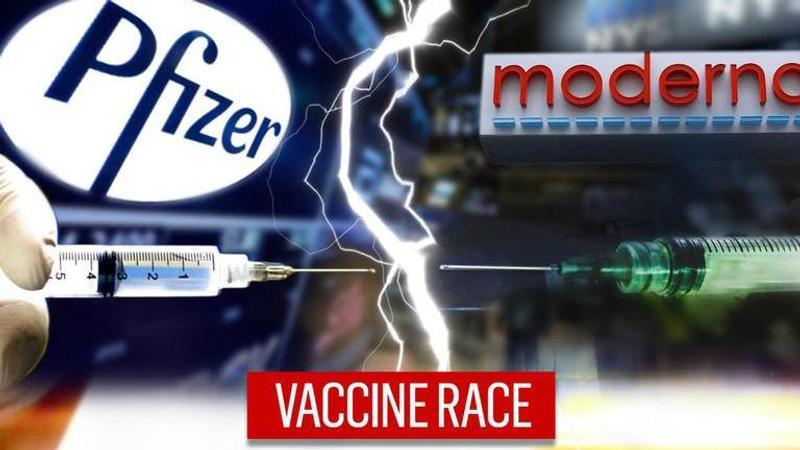Published 13:18 IST, November 17th 2020
It's Moderna vs Pfizer as US Covid vaccines score 90%+ trials success; Which has the edge?
After Pfizer announced its successful vaccine trial, Moderna also posted over 94% success rate leading to confusion over which one could be available earliest

As the world continues to reel from the effects of Coronavirus and keeps spiralling back into new surges, two firms have come out with a hopeful approach as a way forward. Pfizer (US) + BioNTech (Germany) and Moderna (US) both announced last week that their vaccine programs have yielded highly positive results — 90% and 95% efficacy respectively. Moderna's results come hot on the heels of Pfizer's and unsurprisingly boosts confidence that the promise of a vaccine can put an end to ceaseless lockdowns across the world.
Effectiveness of Covid vaccines
Initially, Pfizer and BioNTech together released a sample of their vaccine BNT162b2 (working name) touting a 90% effectiveness rating. Notably, this is much higher than the 60% bar official US health department figures that were projected. The study employed 43,538 participants across diverse social strata and health backgrounds, among which 94% of the candidates were found to have been tested positive for the virus.
Moderna's vaccine mRNA-1273 (working name) was tested on 30,000 subjects at various stages of development and as a result, boasts highest-ever efficacy rate of 94.5%. The studies suggest that it is less arduous than the ultra-cold storage facilities that Pfizer's vaccine would need due to its components. Pfizer's vaccine shots have to be stored at a temperature of minus 70 degree Celsius, whereas Moderna's vaccine can be stored between 2-8 degree Celsius, which means the upkeep to maintain its usefulness is cheaper. The firm also revealed that 100% of its test subjects have recovered after the vaccination.
However, it is imperative to note that a vaccine's effectiveness in numbers will change over time as the study is not conclusive. It is understood that the vaccine protects people in different age groups and demographics with varying levels of effectiveness. For both vaccines, however, the interim results were based on people who showed Covid symptoms and that prompted a virus test. This denotes that a patient who is asymptomatic might react differently to it and there is a lot of uncertainty over whether a vaccinated person runs the risk of reinfection. What is also unclear is whether the vaccine shots will give lasting protection, or whether boosters will be required to prevent reinfection in the future.
After the initial announcements from both firms, Anthony Fauci, top US infectious-disease expert, expressed confidence in the progress and opined that a robust vaccine option will be ready for Americans at the earliest in 2021. Fauci also lauded the firms' trial success and explained how this might see a turnaround in the attitude of people toward vaccination. 'The US may begin offering the vaccine to priority groups at the end of December,' he said.
Vaccine Race - when will we receive it?
Moderna's vaccine appears to be more durable than Pfizer's due to its less rigid storage requirements. Despite the advantages of storing the vaccine in an ordinary refrigerator, it is still too early to declare it a winner because it remains largely untested outside the study subjects. The challenge of matching the vaccine type with the available supply chain and the people who will receive the vaccine could also make a world of difference, which suggests that there may be a need for both vaccines.
Pfizer and Moderna both have plans to make 1 billion doses of vaccine available for use around the world next year. In the meantime, both firms will actively plan to seek approval in other countries as well. Moderna currently expects 20 million doses to be available in the US before the end of this year, primarily because of its simpler logistical parameters.
What we don't know
Vaccine's immunity range — how long it will last; as of now, the test volunteers have only just been treated so there is no concrete data to determine how long they can manage to stay without risking reinfection. The effectiveness of the vaccine in different age groups is also not fully understood at the moment. Another red flag is that both studies do not reveal whether the vaccine simply stops people from becoming severely ill or if it stops them from spreading the virus too.
Source: WHO
Currently, there are over a 100 coronavirus vaccines in various stages of clinical trials, with a handful almost ready to apply for authorisation, namely, Sputnik, Sinovac, India's Covishield and Covaxin from Serum Institute of India and Bharat BioTech respectively are some of the more prominent ones. Most experts, however, believe that the most realistic timeframe for distribution arms to take charge and circulate to all the countries is not until 2021. Some estimate that it may not be until 2022 before a robust solution is guaranteed to all countries.
Updated 13:54 IST, November 17th 2020





